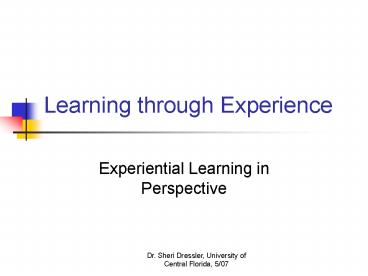Learning through Experience - PowerPoint PPT Presentation
1 / 15
Title:
Learning through Experience
Description:
John Dewey (1889-1952) suggested (1916) that ... Dewey, J. (1938). Experience and education. New York: Collier Books. Edgerton, R. (1997) ... – PowerPoint PPT presentation
Number of Views:23
Avg rating:3.0/5.0
Title: Learning through Experience
1
Learning through Experience
- Experiential Learning in Perspective
2
A Historical Perspective
- The Renaissance Man - Education was for the elite
and not expected to be vocationally oriented - Science, Medicine and law were studied by the
elite since they required more education -
incorporated some applied learning - Apprenticeships in the trades and the arts were
mostly supported by the elite - often many years
in duration - Carried a class prejudice that devolved into
negative views of vocational education
3
A Century of Change
- 1844 Patent Office recommendation to close
- Turn of the century information explosion - more
books written in the last century than in all the
previous centuries combined - Rapid change - science and technical skills
- Materialism - decline in values and some personal
skills
4
Employer Response
- Extensive training for new hires
- Opportunities for students before graduation
- High school programs
- Certificate programs
- Internships
- Cooperative Education
- Scholarships
5
Necessary Skills
- SCANs skills (Secretarys Report on Necessary
Skills,1990) - Similar documents in Canada, the U.K., and
Australia - Pew Institute White Paper on Higher Education
(Edgerton,1997) - Accreditation Bodies, Legislators, Parents
6
Employers Driving the Market
- Increased need for skills increases competition
- Definitions begin to change
- Internships that were one semester capstone
experiences became any job filled by a student - Less focus on educational processes
7
The Educators Role
- Implementation of diverse educational strategies
to meet discipline-related demands - Restructured courses
- Interdisciplinary courses
- Experiential Learning courses
- Need for skills outside the usual curricular
domain - Students are drawn to state-of-the-art
professional environments
8
Experiential Learning
- John Dewey (1889-1952) suggested (1916) that
- learning occurs as a result of problem-solving in
authentic environments faced by the learner - education is the changing of behavior through
experience. - education requires thinking and reflection,
guided by educators, - interaction and environments for learning must
provide continuing opportunities for practice.
(1938)
9
Experiential Learning
- Tyler (1950) operationalized these concepts in an
education process having four elements as
follows - formulating goals
- providing experiences to attain stated objectives
- organizing experiences to provide continuity and
sequence to help students integrate learning
experiences - evaluating to what extent objectives have been
achieved.
10
Evolved definition
- An educational strategy that
- Promotes active and intentional student learning
- Assists students to develop knowledge, skills,
and attitudes toward learning course content and
making a positive contribution to society - Applies classroom content in real-world
situations - Provides major- or service-related experience
- Accommodates for different learning styles
- Includes reflection and supervision
- Partners with industry and non-profit agencies
11
Diverse Formats
- Internships - one semester of major-related
experience in a real-world environment - Co-op - series of paid, progressively responsible
internships over multiple semesters - Service-Learning - students learn course content
and civic engagement through projects in
government and non-profit agencies
12
A Menu of Options
- Cooperative Education
- Practica
- Clinical Practice
- Internships
- Design Projects
- Service-Learning
- Undergraduate Research
- Study Abroad
- Others?
13
All Require Collaboration
University Experiential Learning Faculty in
departments
Employer Work site supervisor
Student By major, academic level skills
14
NSEE Standards of PracticeEight principles for
quality
- Monitoring and continuous improvement
- Assessment and evaluation
- Acknowledgement
- Intention
- Preparedness and Planning
- Authenticity
- Reflection
- Orientation and training
15
References
- Dewey, J. (1916). Democracy and education. New
York Free Press. - Dewey, J. (1938). Experience and education. New
York Collier Books - Edgerton, R. (1997). White paper on higher
education. Philadelphia Pew Charitable Trust. - Kolb, D.A. (1984) Experiential Learning,
Englewood Cliffs, NJ Prentice Hall. - National Society for Experiential Education,
www.nsee.org. - Secretarys Commission on Advancing Necessary
Skills. (1990). SCANS report. Washington, DC US
Department of Labor. - Tyler, R.W. (1950). Basic principles of
curriculum and instruction. Chicago University
of Chicago Press.































